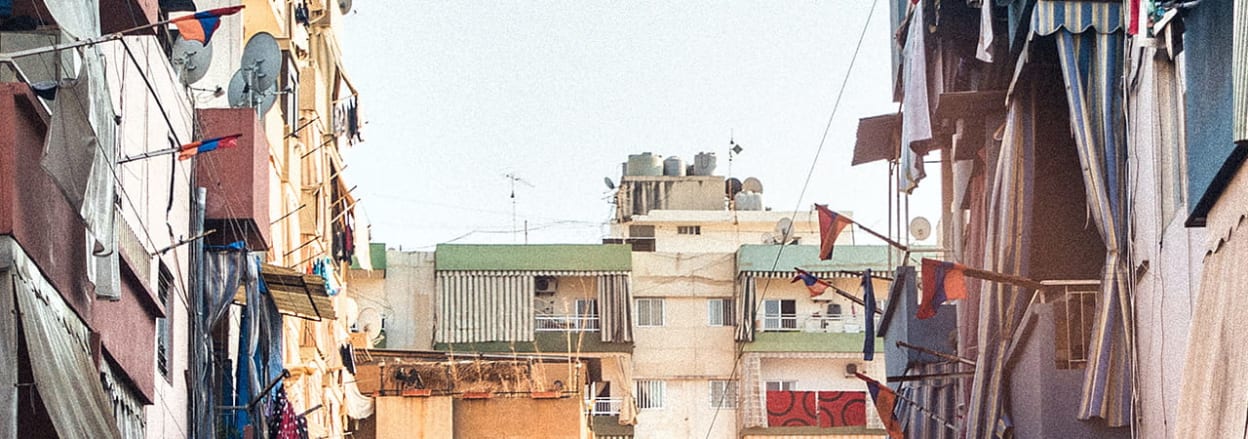Iman and the message of hope
Iman lost her home, her job and her baby daughter. For her, amidst grief and struggle, receiving help with food and rent was not only a practical answer to her needs, but it also brought a message of hope. It said to her: ‘You are not alone.’
Written by Tearfund | 05 May 2020



Written by
Written by Tearfund
Iman* lost her home, her job and her baby daughter. For her, amidst grief and struggle, receiving help with food and rent was a practical answer to her children’s hunger and her family’s fear of having nowhere to live, but it also brought a message of hope. It said to her: ‘You are not alone.’
It wasn’t only food and rent, it was other kinds of assistance too. Each of them designed to meet the needs of a mother and her family. Each of them a weapon against the hopelessness that conflict had brought to them.
Iman and her husband used to live in Lebanon. They were well-educated and had good jobs. He baked sweets for a living and she was an assistant nurse for twelve years – the type of person the world is currently applauding for their essential service. The couple had a small son and when Iman was due with their second child, they returned home to Syria for the birth. They weren’t to know that war would trap them there for five years.
They were stuck. Their village became unsafe and they were forced to live on the move in the region – seeking safety from camp to camp. At one stage, Iman’s husband was captured and imprisoned for two and a half months before he managed to escape.
Life was difficult and terrifying.
In Syria, Iman fell pregnant a third time and gave birth to another daughter. Sadly, this baby girl was born with spinal muscular atrophy. This is a genetic disease affecting the part of the nervous system that controls voluntary muscle movement. It meant that Iman’s tiny daughter often needed to be hospitalised, which was extremely hard as many hospitals in Syria had been bombed and doctors were scarce.
Feeling helpless and hopeless
‘It was not easy trying to move her from one place to another,’ says Iman. ‘[I felt] helpless when she needed hospital and desperate to make her feel better.’
It broke Iman’s heart to see her daughter in pain.
Eventually, the family managed to escape the conflict in Syria. ‘Reaching [Lebanon] was not easy; we had nothing and we knew no one,’ says Iman. They had safety and there were hospitals for her small child, but there were still challenges. ‘While trying to treat my daughter, it was difficult to have her admitted to a hospital even though the UN helped a lot. Not all expenses were covered and we struggled to find money to pay the hospital bills.’
Iman and her husband battled to find work. They both tried really hard, but they couldn’t even afford bread and their children cried all night from hunger.
Fortunately, Iman and her family were not alone.
‘Life was difficult and terrifying.’
A hope...
‘It all started when my neighbour heard my children crying at three in the morning, and [they] did not stop until sunrise,’ says Iman. ‘She came to my house and saw that I had no food, not even bread, to feed my children. She went to [Tearfund’s partner organisation] to ask them to help my family…
‘The social worker immediately visited our home, and after seeing our life conditions and learning about my sick daughter, [Tearfund’s partner] did all in their power to help.’
Sadly, in spite of accessing medical help through our partner, Iman’s baby died. She was just two years old.
‘Finally,’ Iman says, ‘after my daughter’s death, I also became part of an emotional support group for women [through Tearfund’s partner].’
...and a future
They grieve the loss of their tiny daughter and finances are still really tough, but Iman says, ‘Now I am able to hope for a better life, especially for my children.’ She takes comfort knowing that there is food in the house for her children.
‘‘The help I received… made me realise something very important,’ says Iman. ‘I am not alone… [Tearfund’s partner] have brought hope back into my life, with a promise of a better future.’’
Through our partner organisation, her seven-year-old son is finally receiving some education for the first time and spending time with other children his age – which Iman says has made him so much happier. Her five-year-old daughter is able to take part in activities with other children too. And the help with rent removes the fear that used to hang over Iman and her husband of being homeless at the end of the month.
Iman dreams of being able to return to her country, to her home and the life she had. She and her husband long for jobs for themselves and good education and opportunities for their children. But they have found some comfort.
‘The help I received… made me realise something very important,’ says Iman. ‘I am not alone… [Tearfund’s partner] have brought hope back into my life, with a promise of a better future.’
In a time where so many things in life seem uncertain, a promise of a better future is the thing we all need to cling to right now. Jesus is our hope and our sustenance – the well where we draw our courage to keep reaching out, following him where the need is great so that people like Iman, her husband and their children are not alone.
PLEASE PRAY
Heavenly Father,
Thank you that we are not alone and that you never leave us or abandon us. Please will you help Iman and her family. Keep them safe and healthy. Comfort them in their grief. Protect our partners as they respond to the growing coronavirus crisis in Lebanon and around the world. Please help us to be able to continue to meet the needs of those we serve. In Jesus name, Amen.
*Name has been changed to protect identity.
This article references events that took place before the coronavirus crisis.
Share this page
Share this page to spread the word and help support those in need.

Get our email updates
Learn about our work and stay in touch with Tearfund. Hear about our news, activities and appeals by email.
Sign up now - Get our email updates






